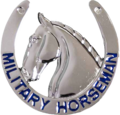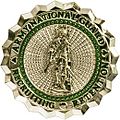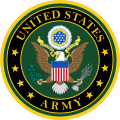
Badges of the United States Army are military decorations issued by the United States Department of the Army to soldiers who achieve a variety of qualifications and accomplishments while serving on active and reserve duty in the United States Army.
Contents
- Combat and Special Skill Badges and Tabs
- Group 1
- Group 2
- Group 3
- Group 4
- Group 5
- Identification Badges
- Other Accoutrements
- National Guard Badges
- Master combat badges
- Proposed badges
- Mariner Badge
- Notes
- See also
- References
- External links
As described in Army Regulation 670-1 Uniforms and Insignia, badges are categorized into marksmanship, combat and special skill, identification, and foreign. [1] Combat and Special Skill badges are further divided into six groups. [2]
A total of six combat and special skill badges are authorized for wear at one time on service and dress uniforms; this total does not include special skill tabs (service uniform) or special skill tab metal replicas (dress uniform).
Personnel may wear up to three badges above the ribbons or pocket flap on dress uniforms, or in a similar location for uniforms without pockets. Personnel may only wear one combat or special skill badge from either group 1 or group 2 above the ribbons. Soldiers may wear up to three badges from groups 3 and 4 above the ribbons. One badge from either group 1 or group 2 may be worn with badges from groups 3 and 4 above the ribbons, so long as the total number of badges above the ribbons does not exceed three.
Only three badges (from groups 3, 4, or 5) can be worn on the dress uniform pocket flap at one time. This total does not include special skill tab metal replicas. Personnel will wear the driver and mechanic badges only on the wearer's left pocket flap of service and dress uniforms, or in a similar location on uniforms without pockets. Personnel may not attach more than three clasps to the driver and mechanic badges. The driver and mechanic badges are not authorized for wear on utility uniforms.
The order of precedence for combat and special skill badges are established only by group. There is no precedence for combat or special skill badges within the same group. For example, personnel who are authorized to wear the Parachutist and Air Assault badges may determine the order of wear between those two badges. [3]
The 21st century United States Army issues the following military badges (listed below in order of group precedence) which are worn in conjunction with badges of rank and branch insignia.












































